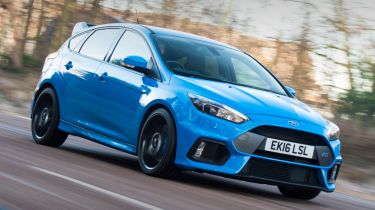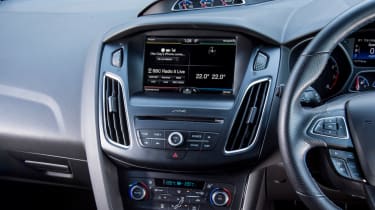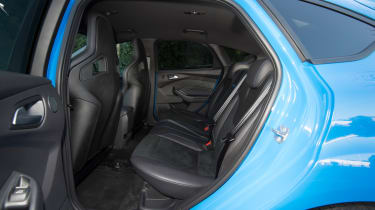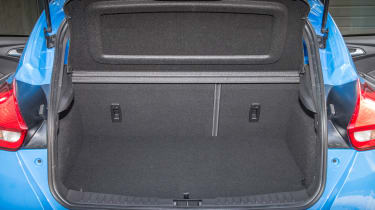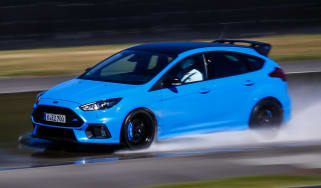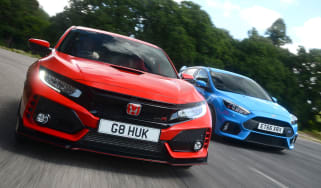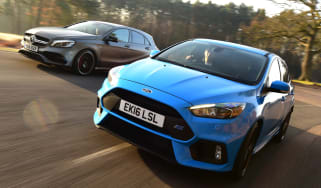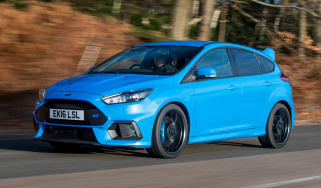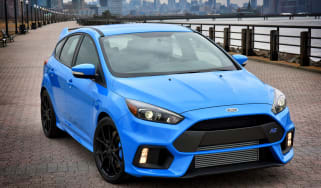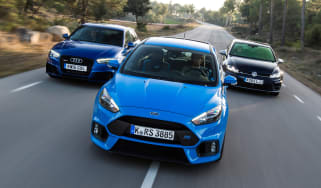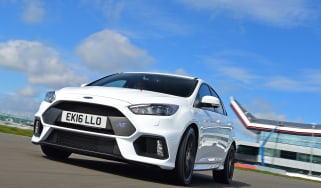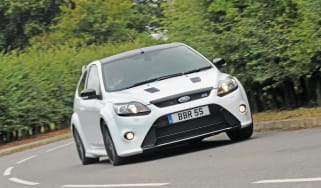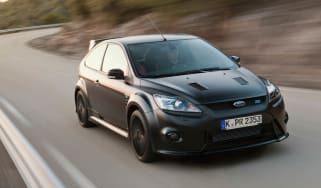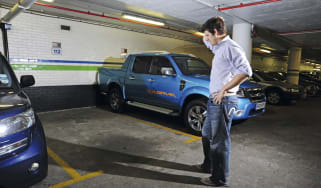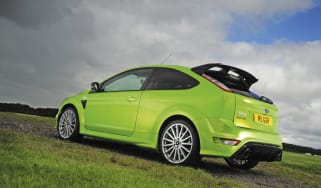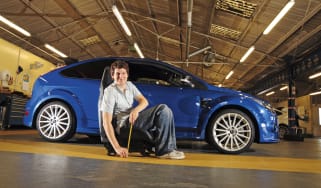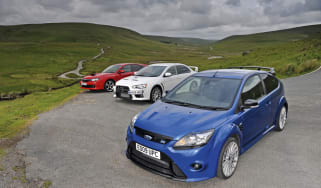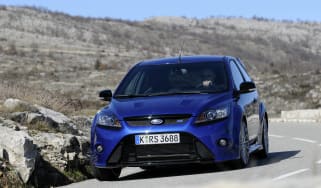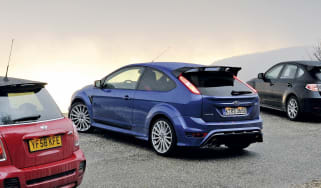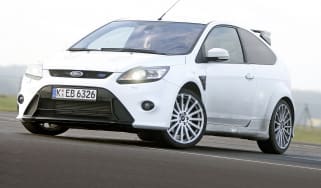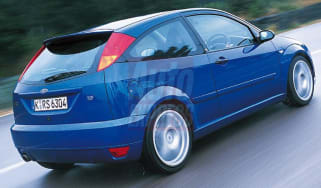Ford Focus RS (2016-2018) review
Wild looks, rocketship speed and sharp handling put the Ford Focus RS at the top of the hot hatchback tree

The Ford Focus RS was for sale from 2016-2018, and while that wasn't very long, it established itself at the top of the high-performance hot hatch tree. For once, the term mega hatch was fully justified when applied to the RS Ford. The fastest Ford Focus Mk3 is great to drive and comes at a great-value price that puts it among some of the most exciting and affordable cars on the road of any type. It's agile and sporty in all the right places and offers massive acceleration, while the turbocharged engine delivers a suitably sporty soundtrack, too.
It wouldn't be a hot hatch without being at least a little down-to-Earth, and the Focus RS is also well equipped and solidly built - so you can use it every day. The stiff ride and small boot will be sticking points for some buyers, but in all other respects a used Focus RS is one of the performance car bargains of the decade.
There's no doubt that the Ford Focus RS was one of the best hot hatchbacks for sale between 2016 and 2018. It was a rival for cars like the Volkswagen Golf R and Mercedes-AMG A45, and thanks to the 345bhp (350hp), 2.0-litre turbocharged engine used under the bonnet, it had the firepower to take on these rivals. Today it's a great second hand choice at an even more competitive price.
Used - available now

2024 Cupra
Formentor
44,913 milesAutomaticPetrol1.5L
Cash £20,497
2023 Vauxhall
Corsa
7,795 milesManualPetrol1.2L
Cash £14,697
2022 Ford
Fiesta
28,320 milesAutomaticPetrol1.0L
Cash £14,397
2018 Nissan
Micra
20,600 milesManualPetrol0.9L
Cash £8,876But there's more to the Focus RS specs than just a powerful engine. It uses a six-speed manual gearbox, which in turn is connected to a trick four-wheel-drive system with smart electronics that include a YouTube-friendly 'Drift Mode' that takes electronic control of lairy slides.
Just one version of the Focus RS was available, although UK tuning specialist Mountune offered a power upgrade that was still covered by Ford's official warranty. It cost around £900 and boosted power by 30bhp. What's more, this kit is also available to be fitted as an aftermarket upgrade on a used Focus RS.
In 2017 Ford added the Option Pack to the list of RS upgrades. This added a Quaife limited-slip differential and matt black exterior tweaks, as well as the Nitrous Blue paint option.
Two special edition Focus RS models were also produced. The Focus RS Red Edition was limited to 300 cars and came in red with gloss black trim and the Quaife LSD. The Focus RS Heritage Edition was limited to 50 cars, and as well as orange paint and the LSD, it also had the 370bhp Mountune performance upgrade fitted.
Unlike the three-door Focus RS Mk2, the Mk3 only came as a five-door hatchback, chiefly because the basic Focus Mk3 was only offered as a five-door. However, stiffer suspension helps to give the RS a taut ride that's on the firm side, although many drivers will be happy to sacrifice some comfort for the sharp drive the Focus RS delivers.
As mentioned the Focus RS Mk3 followed in the footsteps of the Mk1 in 2002 and the Mk2 in 2009. Those two models featured front-wheel drive and a limited-slip diff to get the power to the road, but for the Mk3, Ford decided 4WD was the way to go. As a result, it has a 0-60mph time of 4.7 seconds, some 1.2 seconds faster than the Mk2 RS.
In a way, the Focus RS is a successor to rally-derived 4WD super saloons such as the Mitsubishi Evo and Subaru Impreza, and even Ford's classic Escort RS Cosworth, with its turbo engine and 4WD layout. There are plenty of rivals for the Focus RS, although the majority are hatchbacks. The Mercedes-AMG A 45 and Audi RS 3 Sportback deliver similar pace for more money, while both are available as four-door saloons (the A 45 version badged the CLA 45). The Volkswagen Golf R is an understated option that's still phenomenally fast.
If you want something different, the BMW M140i has rear-wheel drive, while the BMW M2 Coupe is a two-door alternative with muscular looks, and the M240i is the coupe variant of the M140i. Elsewhere, the Subaru WRX STi delivers a turbo 4WD layout in a saloon body, while the latest breed of front-drive hot hatchbacks can deliver thrills getting close to the RS for less money. If you're looking at these, then the Honda Civic Type R, SEAT Leon Cupra and VW Golf GTI are all worth checking out.
Engines, performance and drive
Fast Ford models have always had a reputation for delivering thrilling driving dynamics, but the RS engineers have pulled out all the stops with this Focus. As a result, it’s the first high performance Ford to feature four-wheel drive since the legendary Escort RS Cosworth. Yet unlike the fairly agricultural system fitted to its ancestor, the Focus’ transmission is packed with cutting-edge kit.
At the heart of the set-up is what the company terms its Rear Drive Unit, which can send up to 70 per cent of the engine’s torque to the rear axle, then up to 100 per cent of this power to an individual rear wheel. In effect, Ford has engineered in a torque vectoring facility that aims to combine the stability and traction of an all-wheel-drive car with the adjustability and agility of a traditional rear-driven machine.
In addition Ford has ditched the Focus ST’s variable ratio steering rack in favour of fixed rate set-up that promises even more consistent responses and greater feedback. Also included are two stage adaptive dampers, plus a Drive Mode that allows you to choose from Normal, Sport, Drift and Track modes.
On the road, this hi-tech cocktail results in one of the most exciting hot hatch driving experiences.
As you’d expect, there’s bags of grip, and the Focus turns eagerly into corners and stays locked on your chosen line. The steering is quick, well weighted and packed with decent feedback, while selecting the sportier driving modes adds a little extra weight – although it doesn’t really need it.
Despite the sharpness of the steering, it’s the four-wheel-drive system that really impresses. Even in Normal mode, the rear differential sends significant torque to the outside rear wheel, helping to point the nose of the RS into the bend. Go for the Sport setting and the effect is even more pronounced. In wet and slippery conditions you’ll even get a delicious flick of oversteer when you apply the power.
The Brembo brakes also deserve special mention. Not only are they powerful, but they’re easy to modulate thanks to the progressive action of the well-weighted pedal.
Then there’s the exciting sounding Drift setting. Prod a button on the transmission tunnel, and the four-wheel drive system is primed to deliver controlled and graceful sideways slides without the risk of spinning. However, in reality this addition is a bit of a gimmick, especially for drivers more used to a traditional rear-wheel drive layout. Initially the rear wheels spin to push the rear of the car round, but soon power is delivered to the front axle as the electronics attempt to pull the car straight. It’s okay for a bit of show-boating in wide-open spaces, but ultimately rather unsatisfying.
When you’re not playing the hooligan, the RS is pretty much an ordinary Focus, which means it’s easy to drive and fairly refined. The pedals and steering are reasonably light, while the gearbox has an easy and precise action. Only the firm ride lets the car down.
Even with the standard adaptive dampers in their 'Normal' setting the Focus fidgets and follows almost every bump in the road - although it's no worse than a Fiesta ST in this respect. The RS is firm even in standard mode, but the high-quality damping takes the edge off bumps beautifully. Sport suspension mode is firmer still, and on anything other than smooth roads the RS pogos. It’s never overly harsh, though.
Engine
The Focus RS is a standalone model, so there’s only one engine choice - but it’s a corker. Based on the turbocharged 2.3-litre four-cylinder engine already seen in the Ford Mustang, it features a number of tweaks that push power and torque up to 345bhp and 440Nm respectively. Technical highlights include a separate oil cooler, a larger turbocharger, a high capacity radiator and a large bore exhaust. Fans of older fast Fords will also be heartened to discover that British tuning specialist Cosworth produces the unique aluminium cylinder head.
As you’d expect, performance is impressive, with the RS demolishing the benchmark 0-62mph sprint in a claimed 4.7 seconds. However, when we tested the car we recorded a 0-60mph time of 5.0 seconds. This figure is achieved in conjunction with the standard launch control, which automatically holds the engine revs at the perfect point for a the fastest getaway. This system is effective but brutal, and it's likely the frequent use will put a lot of strain on the clutch and transmission.
Yet on the road it’s the car’s mid-range muscle that really impresses. Once the revs climb past 2,000rpm the Focus simply flies. There’s virtually no turbo lag and the engine responds crisply to the throttle. The slick six-speed manual also allows you to make the most of the considerable performance.
The 2.3-litre unit sounds good, too. A valve in the twin exit exhausts opens at higher revs, boosting gas flow rate and adding a hard edged growl to the soundtrack. Lift off the throttle and you treated to a barrage of pops, crackles and bangs on the overrun. It’s not quite as charismatic as the Audi RS 3’s five-cylinder unit, but it’s not far off.
Want more power? You can ship your RS off to Ford specialist Mountune, which will boost power to 370bhp for about £900. The upgrades include a free-flowing air filter and a bespoke ECU map, as well as a new recirculation valve. What's more, it's a Ford-approved modification, so it doesn't affect the car's warranty.
Alongside the Cosworth-developed 2.3-litre four-cylinder turbo unit’s 370bhp, the Mountune has 510Nm of torque on overboost, which really starts hitting at just over 2,000rpm. There’s a soft edge to the throttle response as the turbo gets up to speed, but once it’s boosting, the performance is savage.
The difference is difficult to notice in any one area as the upgrades have been so well calibrated, but in-gear performance figures we recorded show it’s a match for the Mercedes-AMG A 45, accelerating between 50-70mph in sixth in 5.3 seconds.
Unfortunately, due to drizzly conditions during our test runs, the RS only managed to sprint from 0-60mph in 4.9 seconds; Ford claims an official time of 4.5 seconds for the upgraded car. New turbo pipework releases a few more whooshes from under the bonnet of the Mountune RS, while the exhaust still snarls. There’s not much point revving the engine beyond 5,500rpm, though; change up here and drop it back into the torque band.
MPG, CO2 and Running Costs
You’re not going to buy a Focus RS if you want efficient transport, but Ford has added stop-start to the 2.3-litre EcoBoost engine to help reduce your fuel bills when you want to take it easy.
An official NEDC combined economy figure of 36.7mpg is around 3mpg behind the VW Golf R and Mercedes-AMG A 45, but is slightly ahead of the Audi RS 3 in the same test cycle. Of course, if you’re going to use the EcoBoost engine’s performance, then you’re unlikely to come close to Ford’s claimed economy figures, and the car will easily dip in to the 20s without too much provocation. That’s especially true if you use the car’s overboost function, which bumps torque up from 440Nm to 470Nm for 15 seconds at a time - perfect for rapid overtakes, but less so for efficiency.
Emissions of 175g/km are high, but the Focus RS has a lower list price than rivals, so company car tax costs will be lower. Earlier cars registered before April 2017 cost £205 a year in road tax, which is £25 a year more than the VW and Mercedes, but cars registered after that date are charged at the standard rate for road tax, courtesy of an initial price tag that is well under the £40,000 road tax premium threshold.
Insurance groups
As it’s a performance car, the Focus RS sits in insurance group 40, which is seven groups higher than the Focus ST. It’s in the same band as the Audi RS 3, while the Mercedes A 45 is four groups higher, and the Golf R is six groups below. A Thatcham Category 1 alarm is fitted as standard.
The Focus RS features Ford’s MyKey system, which allows you to set up user profiles for whoever is driving the car, while xenon lights and a Quickclear windscreen help visibility. Ford’s Door Edge protectors were available as an £85 option – these pop out of the doors as you open them and place a plastic strip on the edge of the door to prevent car park scrapes.
Depreciation
New Focus RS models were expected to retain 51 per cent of their value after three years, which is slightly behind the VW Golf R and nearly 10 per cent behind the Audi RS3, but it is marginally better than the Mercedes A 45. As the RS has a lower list price than all of these rivals, you should be able to pick up a used example for a bit less, too.
To get an accurate valuation on a specific model check out our free car valuation tool...
Interior, design and technology
The Focus RS is all about performance, and Ford has given it a suitably aggressive look to mark it out from the rest of the range. At the front there’s a gaping grille that has a secondary air intake below and a pair of inlets on either side. However, the main grille has a big slab of grey plastic across it where the number plate attaches, and while the blue RS badge stands out on it, the front end does look a little awkward.
Further back, there are 19-inch multispoke alloy wheels, or lightweight black forged alloys were available for £595 extra, while deeper sills are added. At the back, the ST’s centre-exit exhaust is replaced by two pipes that protrude from either side of the diffuser, while a towering rear wing is fitted above the rear screen. As standard, the Focus RS comes in Stealth grey, while white was a £250 option, metallic grey and black were £525 and the exclusive Nitrous Blue metallic was £745 extra
Inside, the Focus RS has been given a few blue bits of trim and RS badges to mark it out from the rest of the Focus range, but the biggest change is a new pair of Recaro sports seats up front. They’re finished in leather and Alcantara with blue detailing if you go for the Nitrous Blue exterior paint. You could also upgrade to slimline Recaro Shell seats for £1,145. These are firmer and offer better support, but like the standard chairs they are set just a little too high.
The RS’s dashboard design is largely the same as the Focus ST's, with a large touchscreen on the centre console, while the twin dials in the instrument cluster flank a large trip display and two auxiliary gauges. Like the ST, there’s a set of three additional gauges on top of the dash above the centre console, while the RS adds a Drive Mode button next to the gearlever. The cabin quality is good, with plenty of soft-touch materials, while the layout is easy enough to get along with.
Sat-nav, stereo and infotainment
The Focus RS features a nine-speaker Sony stereo, eight-inch touchscreen and Ford’s much improved SYNC 3 voice control system. It’s a step up on the convoluted menus and poor dash integration of SYNC 2. However, it’s still not the best unit in its class. Apple CarPlay and Android Auto connectivity features, though older models may need a software upgrade to have this added to the SYNC 3 system.
Voice control is operated via a button on the multifunction steering wheel, and lets you adjust phone, stereo and climate settings without taking your hands off the steering wheel.
The infotainment system is the same as you’ll find in lower spec Focus models, so it’s easy to pair your phone via Bluetooth, plus you get a USB socket in a centre console cubby to connect your audio device and a DAB radio as standard.
Sat-nav was a £465 option, and again was the same system you’ll find across Ford’s range, with clear mapping, good traffic alerts and user-friendly guidance instructions.
Practicality, comfort and boot space
Like the standard Focus, the RS model isn’t the roomiest hatchback around. However, performance is a greater priority in a car like this, so buyers will be happier to overlook its smaller carrying capacity compared to its rivals.
The boot has less space than you’ll find in an Audi RS3 or VW Golf R, but at least the standard five-door body means it’s easy to access the back seats, while those in the front have plenty of room and a wide range of wheel and seat adjustment to get comfortable.
The standard Recaro sports seats are a bit bigger than normal, so legroom in the back is slightly reduced, although if you're looking at a car with the upgraded Recaro shell front seats this helps create some room - but some might find them a bit uncomfortable. Plus their large and solid backrests hinder the view forward for passengers sitting in the rear.
Whichever seats you choose, you’ll find that you feel like you’re sitting rather high in the Focus’ cabin. The seats don’t adjust low enough for some tastes, and makes you feel like you’re sitting on the car, rather than in it. Aside from the seats, the rest of the RS’s cabin is the same as the standard Focus, so you get decent door bins, a deep armrest cubby and a big glovebox.
Dimensions and size
In terms of dimensions, the RS is the same size as the standard Focus. That means it’s similar in size to rivals such as the VW Golf R and Audi RS3, but slightly bigger than the Mercedes A 45.
Its five-door body means access is pretty easy, while the thin pillars help visibility out, too. The lower chin spoiler and an overall lower ride height than the standard Focus means you’re more likely to scrape over speed bumps, especially as the stiff suspension doesn’t offer any give over bumps.
The steering is fast and precise to make the most of incredible grip, but there’s not much lock. Fat tyres also sniff out cambers, so the Focus needs guidance on rough roads.
Leg room, head room & passenger space
Space for back seat passengers is limited when compared to models like the VW Golf R and Audi RS 3. There’s just about room for three across the back, although the middle seat is higher than the two on either side, and legroom is even more restricted thanks to the transmission tunnel running to the back of the car. Like the standard Focus, the RS has two sets of Isofix points in the outer rear seats. Headroom is fine in the Focus RS, although the £575 sunroof can cut headroom slightly.
Space up front is good, and while the Recaro sports seats are mounted on the high side, headroom is fine. The heavily bolstered seats hold you in place in corners, but they’re still comfortable in everyday use, but the optional Recaro shell seats are firmer, so try before you buy. These were around £1,200 to upgrade, and while they’re brilliantly supportive, they seat you too high in the cabin, compromising the driving position. They do boost legroom in the back, though.
Boot space
There’s a four-wheel-drive system underpinning the Focus RS, and accommodating the rear differential has resulted in a smaller boot than the standard car – already one of the most cramped in the family car class. With the seats in place there’s a paltry 260 litres to play with, which is less than you’ll get in a Fiesta supermini. In comparison, the VW Golf R has a smaller boot than the standard car, but at 343 litres it’s still 83 litres up on the Focus RS.
While it’s not big, the Focus RS’s boot is a decent shape, with a large floor and no intrusion from the wheelarches or suspension. It also has a shallow boot lip and a wide opening. At least a 60/40 split fold rear seat is standard, and with the rear bench lowered there’s a reasonable 1,045 litres on offer. However, you need to flip the seat bases up if you want a flatter floor. The seats are released via a pair of shoulder-mounted buttons, and they are easy to fold, while the parcel shelf is easy to remove, too.
Reliability and Safety
The Focus RS is essentially an uprated version of the standard Focus hatch. It uses the same electronics and infotainment system as the standard car, while some of the mechanical parts are uprated kit developed from the Focus ST hot hatch.
The 2.3-litre EcoBoost engine is a development of the 2.0-litre EcoBoost in the Focus ST, and it’s also found in the Ford Mustang. However, bespoke components in the Focus RS mean power has been bumped up to 345bhp, making it the most powerful EcoBoost engine in the line-up. The six-speed manual gearbox is also a beefed up version of the transmission in the Focus ST, while Ford’s RS department has plenty of experience in motorsport, and its engineers will know how to build a car that is fast and reliable.
The chassis has been developed to deliver an involving drive, while the car’s electronics are designed to help you explore the car’s limits with an electronic safety net in place should things go wrong. There are four Drive Modes, while the four-wheel-drive system and its torque vectoring electronics should ensure the Focus RS is a sure-footed performer, even in the wet.
The standard Focus has a five-star Euro NCAP rating earned in 2012, and the RS model should be equally safe. Standard kit on the flagship model includes six airbags, tyre pressure monitors, auto lights and wipers, a Quickclear windscreen and high-performance Brembo brakes. Autonomous emergency braking was a £200 option.
The Focus RS is well built from plenty of bespoke materials, and considering the mass-market standard car performed reasonably well in our Driver Power survey, the tailor-made RS model should be a solid and reliable machine. It certainly feels well built, with plenty of soft-touch plastics used throughout.
Warranty
As with the standard Focus, you get a three-year, 60,000-mile warranty on the RS model. That’s similar to rivals, while the 12-year corrosion warranty covers the paintwork against manufacturing defects. There’s a one-year roadside assistance policy with the Focus RS, while Ford offers warranty extensions of 1-2 years for a little extra outlay.
Servicing
The Focus RS has the same service intervals as the standard car, at one year or 12,500 miles, and it doesn't need to go to an RS specialist to be tended to. It’ll be pretty easy to get your car maintained, too, as Ford has over 700 dealers across the country, just don’t expect a first-class service. Ford’s franchises finished poorly in our Driver Power survey, with owners complaining of a lack of personal service from its franchises.
